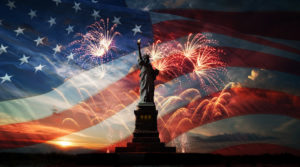by David Barton
This Fourth of July America celebrates its 240th birthday! The Fourth of July is one of our most-celebrated holidays, a fact confirmed by a very elderly John Quincy Adams in a speech he delivered on July 4 in 1837, America’s 61st birthday.
John Quincy Adams properly reminded the crowd that one of the most-important elements of the American movement for independence had been its spiritual underpinnings. He asked:
Why is it that, next to the birthday of the Savior of the World, our most joyous and most venerated festival occurs on this day? And why is it that . . . thousands and tens of thousands among us . . . year after year . . . celebrat[e] the birthday of the nation? Is it not that . . . the birthday of the nation is indissolubly linked with the birthday of the Savior? That it forms a leading event in the progress of the Gospel dispensation? Is it not that the Declaration of Independence first organized the social compact on the foundation of the Redeemer’s mission upon earth? That it laid the cornerstone of human government upon the first precepts of Christianity?
The fact that there was a spiritual emphasis at the birth of the nation was confirmed by numerous others. For example, Benjamin Kent, in a letter to Samuel Adams, declared: “It is God’s doing!”
So clearly did John Adams see God’s hand in America’s independence, he even believed that to help America achieve her independence was the single reason God had created him. As he told his wife, Abigail: “The Colonies must be declared free and independent States. . . . When these things shall be once well finished, or in a way of being so, I shall think that I have answered the end of my creation.”
In a similar tone, John Page (later a Virginia governor) told Thomas Jefferson, “I am highly pleased with your Declaration. God preserve the United States! We know the race is not to the swift nor the battle to the strong (Ecclesiastes 9:11). Do you not think an angel rides in the whirlwind and directs this storm?”
Yet, declaring independence was only the beginning. Much sacrifice, patience and reliance on God would still be required. As signer of the declaration, Abraham Clark explained: “This seems now to be[gin] a trying season; but that indulgent Father who hath hitherto preserved us will, I trust, appear for our help, and prevent our being crushed; if otherwise, His will be done.”
Our founders knew that without God’s help—or, as they announced in the declaration itself—“a firm reliance on…divine Providence”—they would never achieve their objective.
While we celebrate our liberties this year, let us not forget that those liberties came only through great, personal sacrifice: Nine of the 56 signers of the declaration died during the war. Five were captured by the British and tortured before their death. Twelve had their homes destroyed by British troops, and three lost their sons to the enemy. Such sacrifices remind us that liberty is never free—every generation must defend it anew.
The possibility that we might forget the sacrifices necessary to preserve liberty was something which troubled our founders. This was made clear in a letter from Dr. Benjamin Rush to John Adams after witnessing the celebration surrounding America’s 35th birthday in 1811. Dr. Rush told Mr. Adams:
The 4th of July has been celebrated in Philadelphia in the manner I expected. The military men, and particularly one of them, ran away with all the glory of the day. But scarcely a word was said of the solicitude and labors and fears and sorrows and sleepless nights of the men who projected, proposed, defended, and subscribed [signed] the Declaration of Independence. Do you recollect your memorable speech upon the day on which the vote was taken? Do you recollect the pensive and awful silence which pervaded the House when we were called up, one after another, to the table of the President of Congress [John Hancock] to subscribe what was believed by many at that time to be our own death warrants?…
While we should remember the sacrifices, it is more important that we remember the proper manner to celebrate the Fourth of July. What is the proper manner? The answer was given in a letter that John Adams wrote Abigail on the day they approved the declaration. He forecast: “I am apt to believe that [this day] will be celebrated by succeeding generations as the ‘Day of Deliverance’ by solemn acts of devotion to God Almighty!”
Celebrate the Fourth of July with fireworks, festivities and parades. But also celebrate it by setting aside a time to thank God for His numerous blessings upon our country.
